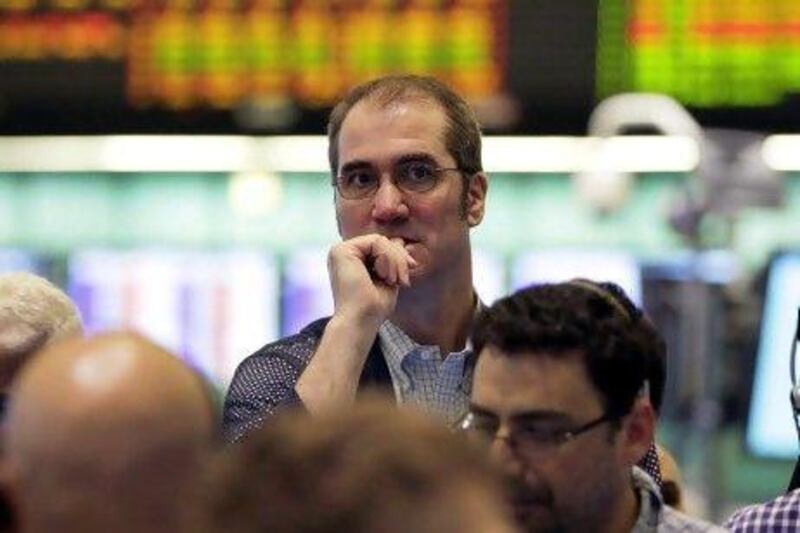Hold onto your hats, this is going to be a bumpy summer for investors.
Stock markets have been on a roller-coaster ride over the past five years and it looks like we're heading for another nerve-rattling spin on the big dipper.
There is plenty to spook markets right now.
The euro-zone crisis is going from bad to worse. French and Greek voters have rejected German-imposed austerity, Spain is buckling under the industrialised world's highest unemployment rate of 24.4 per cent and the single currency is threatening to unravel altogether. The United Kingdom is safely out of the euro zone, but officially in a double-dip recession.
And that's only Europe. The United States risks falling off a fiscal cliff shortly after the presidential elections in November, unless its gridlocked politicians can hammer out a deal on spending cuts and tax increases.
China is battling to deflate its property bubble and avert a painful hard landing, and then there's the matter of Israel's threats to bomb Iran. Welcome to the summer fun ride.
People are understandably nervous right now, says Jamal Saab, the head of Middle East and North Africa at Natixis Global Asset Management. "About half of investors are now more worried about losing money than making it, according to our annual survey, while 86 per cent now view risk in terms of loss, rather than reward. The potential for losing money is a huge concern."
Yet 2012 started with such promise. Markets were soaring on positive US jobs data, strong company earnings and yet another blast of central bank liquidity, this time courtesy of Mario Draghi, the new head of the European Central Bank. But as every fairground thrill seeker knows, the steeper the climb, the sharper the plunge.
To make the ride more exciting, investors are effectively strapped into their seats, says Jeremy Batstone-Carr, the head of private client research at Charles Stanley Stockbrokers. "Interest rates aren't going to rise for years. If you want any kind of investment return, especially income, you have to grit your teeth and hold on for the white-knuckle stock market ride."
Mr Batstone-Carr is bracing himself for a summer dip. "The first-quarter company reporting season was quite good, but that was mainly because last year was so bad. Companies may struggle to produce impressive results in future, yet the stock market is pretending they will."
Another worry is that share prices still don't reflect the cost of a euro-zone breakdown. "If, say, Germany pulls out because the other countries reject austerity, that would be a massive shock. Yet analysts and strategists haven't factored this into their sums."
Mr Batstone-Carr is losing faith in stock markets altogether. "The old assumptions no longer apply. We were told the stock market is a discounting mechanism, where share prices reflect how investors expect the economy to perform in the next six to nine months. That mechanism is broken," he says.
"We were told the market accurately reflects economic fundamentals. But western markets are now dominated by high-frequency trading algorithms, known as robo-traders, which simply respond in a knee-jerk fashion to the news of the day. So that no longer applies either."
Many investors have been scared away altogether and lower trading volumes have only made markets more volatile, Mr Batstone-Carr says. So should you be running scared?
If you ignore all the screaming, this summer could actually be a great time to go shopping for shares at discounted prices.
Last summer certainly was. It felt like the end of the world then, as global stock markets fell more than 12 per cent, but they recovered sharply in the autumn.
In volatile markets, the canny investor aims to buy on the dips, rather than the highs. You should only invest money you won't need for at least five or 10 years, to give time for the madness to end - as it must one day.
And don't blow all your money in one go. Keep some aside because things could easily get worse before they get better.
If all that sounds too nerve-wracking, consider setting up a regular monthly payment into a global mutual fund. That way you don't have to worry about timing the market and will actually benefit from further volatility, as your monthly payment will buy more units when markets have fallen.
There are plenty of opportunities amid all the volatility, says Marino Valensise, the chief investment officer at Baring Asset Management. "We remain positive on equities relative to other assets. We particularly like emerging markets and see strong long-term investment potential in the Middle East and North Africa."
Stocks and shares have one more thing in their favour. In a low-interest rate world, big global blue chips offer attractive dividend yields, such as Johnson & Johnson (3.3 per cent), Roche Holdings (4.3 per cent), HSBC (4.6 per cent) and Royal Dutch Shell (4.9 per cent).
These dividend payments can keep your portfolio ticking over nicely until stock markets recover, at which point you should finally enjoy some capital growth as well.
A strong, growing dividend yield can smooth over some of that market bumpiness, says Rob Burgeman, the divisional director of Brewin Dolphin Investment Management. "Somebody who invested £100,000 [Dh578,000] in a balanced portfolio of UK equities, bonds and cash in March 1993 and reinvested all their dividends would have £379,606 at the end of this March. That's an increase of 279 per cent, while inflation rose just 73 per cent."






